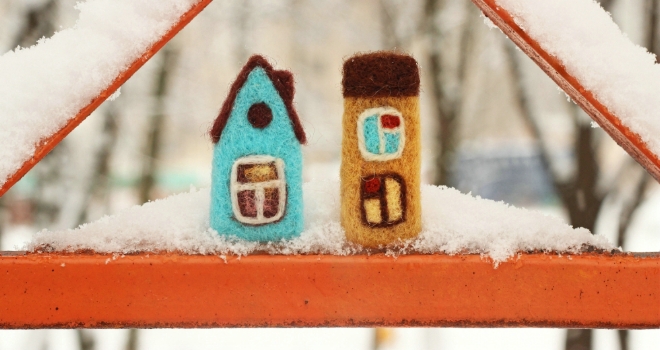
"As the nights begin to get colder and the days shorter, it’s worth performing a health check on your home. "
Insulate your home
One of the most immediate changes you can make to prepare your home for winter is to have loft insulation installed. Fitting your home with insulation will help to avoid losing much of your home’s heat through the roof, which can often bring energy bills down by a considerable amount – up to £225 per year in some cases.
However, when it comes to getting loft insulation fitted, it can pay to do the research and see if there are any schemes available to you. Ricky Swann of Heat Insulation Ltd advises: “The vast majority of loft insulation jobs can be paid for by a government grant, but people who go down the DIY route will often purchase the material themselves, as they do not know the grant exists. In cases where someone has undertaken a DIY job and then got damp, all the loft insulation will more than likely need replacing.”
Protect your pipes
Ice and frost can quickly cause costly damage to a property, leading to faulty or burst pipes, which often end in major water damage. However, this situation is relatively easy to avoid with the right preparation.
The simplest and most effective way to keep your pipes safe during winter is to ensure that any water tank pipes are properly insulated so they aren’t at risk of freezing, as this is when the damage occurs. Also, keep an eye on any leaky taps and try to get these fixed before the temperature plummets, as even a small drip can turn into a major leak in the winter weather.
Clean the drains and gutters
Whilst autumn can paint a pretty picture in the garden, unfortunately it can also lead to a major build-up of dirt and leaves in your drains, which can potentially cause leaks through the roof and walls as guttering overflows.
During autumn and the start of winter, ensure you check your guttering and drainpipes regularly to avoid any excessive build up. This is particularly important as many insurance companies won’t cover water damage if it could have been avoided by regular maintenance.
Check your boiler
Getting your boiler regularly checked and maintained is an important part of being a homeowner, but the lead up to winter is arguably the most important time to make sure your boiler is in good working order.
When the temperature drops, your boiler is likely to be working overtime to keep the house warm, so a boiler breakdown will lead to a miserable winter. Not only this, but an efficient and well-maintained boiler can help to save money on heating bills too, so it’s worth looking at before winter sets in.
Make sure you’re covered
In the run up to Christmas, the last thing any household needs is to be hit with a repair bill, so it’s essential to make sure there is adequate insurance cover for any winter-related damage.
Take some time to go through your home insurance policy and ensure everything is up to date and every eventuality is covered should the worst happen. If there is anything that you’re not covered for (that you think you should be), use this time to give your insurer a call and discuss adding it to your policy. It’s unlikely to cost much more and will provide valuable peace of mind throughout the winter months.
Switch energy suppliers
During this time of year, energy suppliers are likely to be on the lookout for new business and as such, are likely to have a range of offers and incentives available for those who make the switch.
Before winter arrives, spend some time going through a few comparison sites, to see which offers are best suited to your needs. This investment of time and effort before the winter months can often lead to substantial savings on household bills in the long-run.
Bleed your radiators
Bleeding the radiators is a simple job that many people know they should do, but often overlook. Essentially, when air is trapped in a radiator it prevents it from heating up properly, meaning you need to turn up the temperature, and in turn the heating bills also rise.
If you can hear clunking in your radiators, then it’s time to bleed them. To do this, switch on the central heating to push out any trapped air, then carefully check for cold spots at the bottom of the radiator. Once you’ve done this, switch off the central heating, place a towel beneath the radiator and use a radiator key to turn the valve by around a quarter turn – you should hear a hissing as the air escapes. Once the hissing subsides, close the valve and repeat on further radiators. Be sure to re-pressurise your heating system by ensuring the pressure on your boiler is set to 1.0 – 1.5 bar using the central filling loop connected to the boiler (for reference, it looks like a tap).
You may also want to consider buying radiator insulation wall panels to reflect heat back into your home rather than being lost through the walls and windows.
Managing director of Hitachi Personal Finance, Vincent Reboul, said: “As the nights begin to get colder and the days shorter, it’s worth performing a health check on your home. Whether it’s simple things like bleeding your radiators, or more pricey improvements such as properly insulating your home, the financial benefits you’ll see can far outweigh the costs of trying to heat a poorly insulated home or fixing a burst pipe in the dead of winter!”





